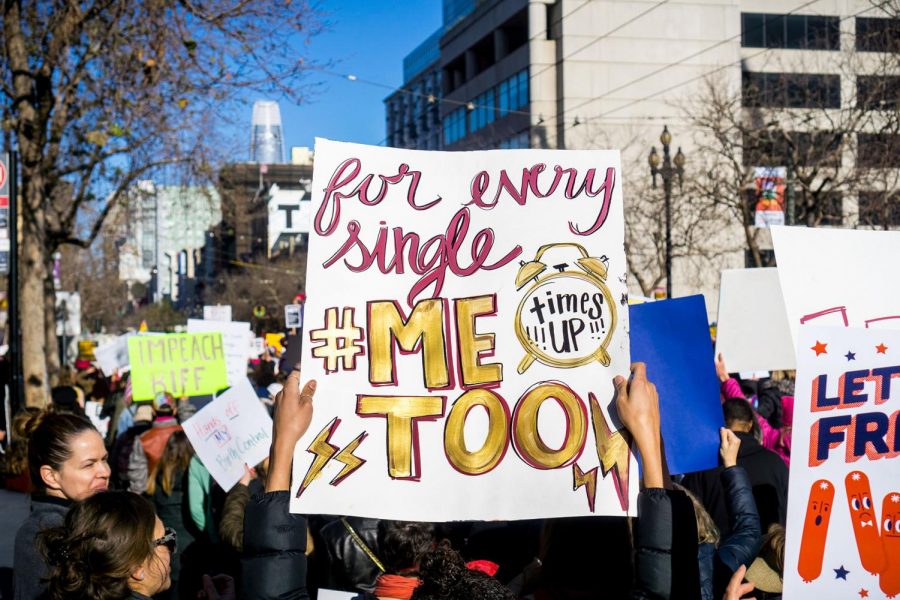Getting to the Bottom of Rape Culture
In order to properly address the high numbers of rape and sexual violence, adults must begin education and dialogue with teens in order stop raising aggressors.
PHOTO | Andrei Gabriel Stanescu
Men and women alike protest sexual assault in San Francisco in Jan. 2018.
The 2016 #MeToo movement began a reckoning of men in power who used their status to take advantage of women across the nation and across all different industries. This caused an awakening for the public to turn their attention to all men who are “in charge” and call them out for their behavior. However, it largely failed to address the root of the problem or try to systematically stop rape by educating young people. Adolescence is a time of self-discovery for boys and girls alike and is when humans learn how to behave and should be the time to teach teenagers about the consequences and negative impacts of sexual violence rather than waiting until they are an adult when they have either already assaulted someone or been assaulted themselves. If we as a society teach teens and address issues with each other’s behavior early on we could get ahead of the problem.
BREAKING: A group of Syracuse University students have gathered outside of the Psi U fraternity, alleging a rape culture at this fraternity and others on campus. They claim that someone living in the house raped someone. We can't confirm that. @CitrusTVNews pic.twitter.com/eF9eAO3tMi
— Ricky Sayer (@RickyReports) September 22, 2021
Nationally, 81% of women and 43% of men reported some type of sexual assault and/or harassment, according to the National Sexual Violence Resource Center. These numbers are absolutely sickening to even think about that on average 81% of my female friends and family members will experience sexual harassment or assault at some point in their lives. Action needs to be taken not only to reprimand the aggressors but also to decrease this number significantly because it is simply unacceptable.
More and more students are starting to speak up against sexual violence and rape. At the University of Nebraska-Lincoln, the alleged rape of a 17-year-old girl by a 19-year-old member of Phi Gamma Delta sparked massive attention on campus at protests and on social media which has resulted in increased advocates for victims, hiring a director of Sexual Misconduct and creating a statement on the syllabus about sexual misconduct, according to the Lincoln Journal Star. The steps being taken by the administration at UNL are positive; however, it is unfortunate that it took protests and the alleged rape of a young girl to achieve a change in the university.
We want justice. FIJI no more. #UNL #protest pic.twitter.com/WPhdjHqU1J
— Jessica Blum (@JessicaBlumWx) August 26, 2021
Even locally, students at Shawnee Mission East High School wore all black Sept. 17, 2021, to show solidarity with students who are victims of sexual violence. This goes to show that even high schoolers can understand that the way society deals with sexual violence is wrong so why can’t adults? I am so over the notion that women and men need to cover up or act a certain way to not get harassed or assaulted. This antiquated belief is outdated and quite misogynistic. All human beings are allowed to dress however they please and should not have to live in fear because they simply choose to express themselves.
More programs such as the CDC’s STOP SV program need to be used to finally put an end to the myth that it is the victim’s fault for getting attacked. STOP SV has five main tenants: provide opportunities to empower girls, promote tactics that protect potential victims, educate students on skills that prevent violence, foster safe places and support survivors, according to the CDC.
This is so moving. We must do better. #Sexualassault #MeToo pic.twitter.com/V4137yzMSF
— Suburban Polly 🇨🇦🇺🇦 (@SuburbanPolly) September 24, 2021
Until we address the issue of rape and sexual assault through education in all schools we will not see a decrease in sexual violence because it is so deeply ingrained in the brains of people, especially men, that it is ok to catcall people or pressure their partners, committed or not, into something that they are not comfortable with. Although it is an uncomfortable conversation to have because of the stigma around extramarital and teen sex, it must be one that teachers, students, and parents have to ensure the safety of all people.



